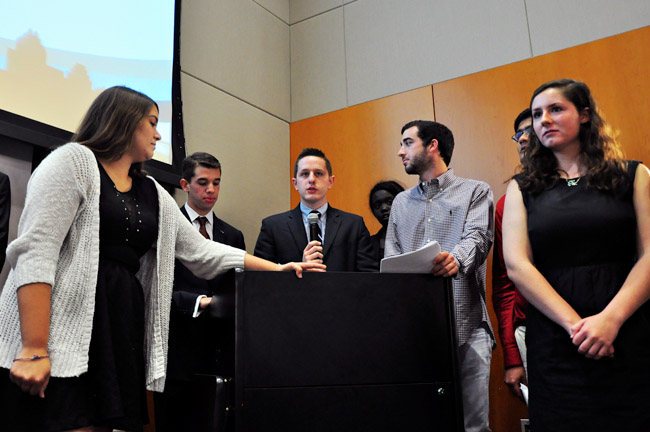Student Government and Interfraternity Council members are working with Austin City Council member Chris Riley to revise the city sound ordinance, which, in its current state, could alter West Campus’ social scene.
The sound ordinance is part of a city plan intended to reduce sound levels in West Campus. The plan requires groups to apply for permits at least 21 days before an event and submit a site plan with specifics of their properties. According to Taral Patel, SG university-wide representative, the maximum sound level allowed by the ordinance is equivalent to a cell phone ringing at its highest volume.
At Tuesday’s SG meeting, the assembly discussed a resolution that voices student concerns with the ordinance. The proposal mirrors a resolution sponsored by Riley to be presented at the City Council meeting Thursday. IFC President Edwin Qian met with Riley on Tuesday to discuss the issue.
“Our focus is really to make sure they know they have a channel through which they can advocate to the city,” said Robert Svoboda, co-director of the SG City Relations Agency.
The SG assembly sent the resolution to the Legislative Affairs Committee at Tuesday’s meeting.
Both SG’s and Riley’s resolutions do not provide a specific plan of action, but they instead say the sound ordinance poses a problem to students.
“We haven’t really gotten to the point of deciding which things do make sense, but we have [to] acknowledge that what we have on the books doesn’t make sense,” said Leah Bojo, the policy aide for Riley who spoke at the meeting.
Svoboda said SG is still exploring potential solutions, and that the main area of concern is the extensive permitting process intended for large-scale events.
“The hope is to create some sort of private party category for the permitting, so that it doesn’t change it all the way to commercial or public property,” Svoboda said.
Bojo said the sound ordinance is not new to Austin, but the code will be upheld to a stricter standard in the West Campus area.
“For a long time, these city staffs haven’t really been consistently applying those regulations in West Campus,” Bojo said. “They have been looking the other way and letting some parties happen. Some staffs, particularly the city fire marshall, felt that there were some parties that were getting out of hand and something needed to be done.”
Tanner Long, SG College of Liberal Arts representative, said he and other students fear the ordinance will have a negative effect on the entire student body, including Greek life, co-ops, West Campus residents and student organizations that host events such as tailgates in the area.
“It was the Greek organizations that originally approached us about this,” Long said. “However, those events — for instance Round Up — are attended by people that are not only Greek but also students who attend the University.”
Bojo said Riley realizes the ordinance in its current state is not likely to gain the compliance of students. For that reason, she said Riley is asking for changes to be made to the ordinance. In the meantime, Riley and his staff are requesting that city officials be flexible on the policy.
“We know that there are events in the pipeline,” Bojo said. “And we’re asking staff to have a little flexibility on the parties that are happening between now and when we get the codes in place.”
This article has been updated to clarify the status of the Student Government resolution.















